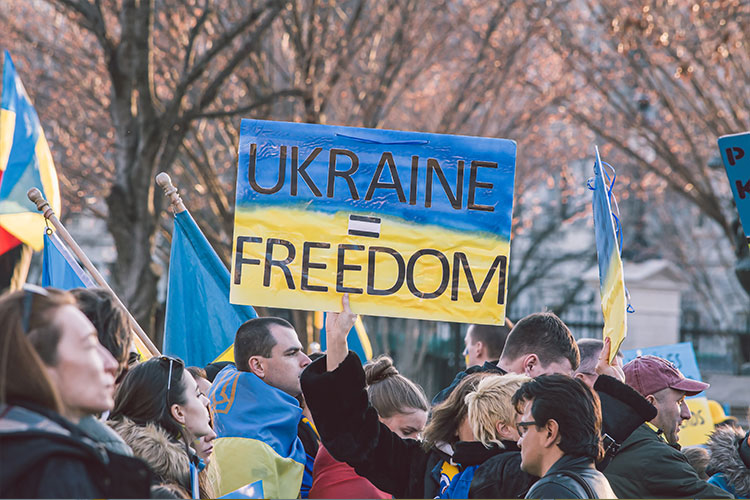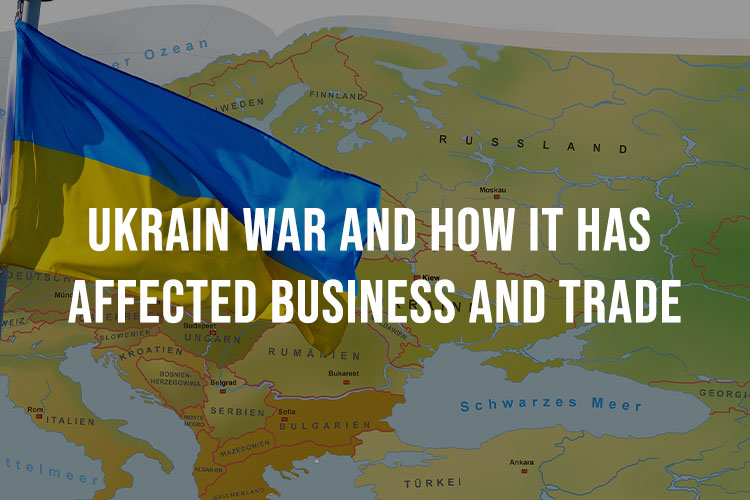On 24 February 2022, the world woke up to the shocking news of the Russian invasion of Ukraine. The impact of the Ukraine war on business and the global economy is expected to be far-reaching and long-lasting. Every war has immediate and visible effects such as suffering, death, and displacement of people. However, it’s the far-reaching consequences on industry and business that will create a lasting impact. The confrontation between Russia and Ukraine will have three major implications for the world economy: monetary sanctions, commodity price volatility, and supply constraints and disruptions. Through this blog, we aim to analyze the impact of Ukraine war on business, as well as look into history to uncover how past wars have affected industries, the relay effect of global sanctions on India, as well as industries that boom and fail during a war.
The unpredictable effect of wars on the business sector
While the impact of wars on industrial output can vary significantly, the current conflict between Russia and Ukraine is likely to have a significant effect on the world economy. The effect of the Ukraine war on the world economy will be far-reaching and long-lasting, with implications for industries, businesses, and individuals across the globe. The Revolutionary War, War of 1812, Civil War, World War I, and World War II are all examples of past conflicts that have affected the world economy in different ways.
However, the effect of the Ukraine war on the world economy is unique to this conflict and is expected to be felt for years to come. The monetary sanctions imposed on Russia will have an immediate impact on the global economy, with some industries being hit harder than others. Commodity prices are likely to become more volatile, and supply constraints and disruptions could cause significant problems for businesses that rely on imports or exports. Despite the challenges posed by the Ukraine war, there are industries that are likely to boom during the conflict, such as defense and security, while others may struggle to survive. It is important to analyze the effect of the Ukraine war on the world economy carefully to understand how businesses and individuals can prepare and adapt to the changes that lie ahead.

Building your business success with our strategies and solutions.
Increase your Sales: Lets boost your sales with irrestible marketing tactics
Control your expenses: Take charge of your expenses and optimize your performance.
Build your team: Partner with us to build a high-performing team for your business

Industries that witnessed a boom in post World War II
With respect to World War II, highly productive growth began before the war and persisted until the early 1970s. Automated technology such as feedback processors, which first debuted in the late 1930s, became a fast-growing field of investment after the war improved manufacturing. Major highway infrastructure, distribution and storage warehouses, and handling equipment, including forklifts and multimodal containers, benefited the retail and wholesale sectors. Oil superseded coal in a variety of applications, including railways and ships. In agriculture, the post-World War II period witnessed the wider implementation of the following:
- Chemical fertilisers
- Tractors
- Combine harvesters
- High-yielding variety
- Pesticides
The relay effect of global sanctions on Russia, in India
The impact of Ukraine war on business is a significant concern, given the Russian invasion of Ukraine and the subsequent sanctions imposed by several western nations. One of the most visible risks is the potential impact on commodity trade, especially oil and gas supplies to Europe. This risk has already led to a significant increase in the cost of essential commodities, which may result in higher global inflation and weak global economic GDP. The impact of rising interest rates on financial market activities will also be negative for businesses.Banking sanctions are likely to hurt the Russian economy, and variations in commodity prices and disruptions in commodity distribution networks are the two main avenues through which the current economic crisis is capable of affecting the global economy. The impact of the Ukraine war on business has been felt across the world, with worldwide oil and natural gas prices climbing dramatically in the week succeeding the commencement of the war, particularly in Europe. As a result, mineral and food products such as nickel, palladium, neon, wheat, and corn saw price increases.India, which relies heavily on imports to meet its crude oil requirements, has already seen the impact of the Ukraine war on business. Direct trade with Russia accounts for just 1% of India’s oil imports, but the knock-on effect of high inflation and slow growth is significant. With international oil prices rising to a 14-year high amid a growing Russia-Ukraine confrontation, the rupee has fallen to a new low, and bond yields have jumped, raising fears of greater inflation and a widening current account deficit.If global commodity prices continue to rise, many nations, particularly in Europe, may see faster and extended inflation. This can stifle economic growth and lead to supply chain disruptions, which would only exacerbate the situation. The impact of the Ukraine war on business will almost certainly affect central bank policies as they try to mitigate the negative effects of rising prices and supply chain disruptions. In the midst of this uncertainty, the Rupee has plummeted to its lowest level ever, more than Rs. 77 to the dollar, which will raise the cost of imports for Indian businesses. While the effect on India’s non-weapons, non-oil trade with Russia is negligible, the impact of the Ukraine war on business is already being felt across multiple industries and regions.
How conflict and tragedy mingles with the global stock market percentage.
The impact of the Ukraine war on business and the global economy has been felt across the world, with stock markets tumbling and investors becoming increasingly concerned about the potential consequences. As with past wars, the initial effect has been a weakening of the markets, although there are some crucial differences this time around. In India, domestic stock markets have fallen by almost 3% amidst the Russian-Ukrainian crisis, with traders reducing their stakes in response to concerns about the potential impact on the Indian economy. Meanwhile, Japan, Hong Kong, South Korea, and Australia have all seen their stock markets fall by up to 3%, indicating the widespread impact of the conflict. The increasing crude oil prices also weigh on investors’ minds, adding to the uncertainty and volatility in the market. Despite the tragedy and suffering caused by the war, the markets continue to regard it with indifference, focusing instead on its potential impact on businesses and the global economy.

Industries That Fail After A War
As Russia’s war against Ukraine intensifies, various industries are now confronting supply chain challenges and macroeconomic difficulties and are failing.
Automobile Industry
The impact of Ukraine war on business is becoming increasingly visible, as rising fuel costs and commodity prices begin to take their toll on industries around the world. With crude oil prices approaching $120 per barrel, logistics costs are expected to rise, putting additional pressure on businesses already struggling to maintain profitability. In addition, many metal prices used in the automobile sector, such as aluminium and nickel, have also suffered from high rising costs, making it more difficult for companies to produce goods at a reasonable price. The impact of the Ukraine war on businesses is not limited to rising costs, as there is also the potential for property seizures. For example, Mercedes-Benz has holdings in Russia worth approximately 2 billion euros ($2.2 billion), which may be at risk if Moscow decides to confiscate the assets of international corporations. As the crisis between Russia and Ukraine continues to escalate, the impact on the global economy and business community is likely to become even more significant.
Semiconductor Industry
Considering the ongoing conflict in Ukraine and its impact on the global economy, it is worth examining the potential effects of the war on the businesses that dominate the country’s natural resource industry. It is well-known that Ukraine currently generates 70% of the world’s neon, a critical component in many industries, including electronics and lighting. However, with the conflict continuing to disrupt supply chains and production in the country, the global neon industry may soon face significant challenges.
Similarly, Russia’s dominance in the production of palladium, a precious metal widely used in the automotive industry, is also likely to be affected by the ongoing conflict. The disruption caused by the war could result in shortages and price increases, potentially impacting the profitability of businesses that rely on palladium.Despite these potential challenges, the natural resources industry is still expected to grow in the coming years, according to research company Statista.
In fact, the industry was valued at over $440 billion in 2020 and is expected to expand to around $550 billion this year, on its way to reaching $600 billion the following year. However, the impact of the Ukraine war on businesses in this industry cannot be ignored, and it will be important for companies to carefully monitor the situation and adapt their strategies accordingly to mitigate potential risks.
Agriculture Industry
Russia and Ukraine account for over 30% of world wheat export, 32% of global barley trade, and 17% of global maize commerce. As a result of the cessation of shipments from the two countries, FMCG prices have skyrocketed.
Industries that boom after a war
There has also been a positive impact of the Russian-Ukrainian conflict on some industries. The following industries have witnessed a boom in post-war phases.
Wind And Solar Industry
Ever since the attack, the S&P Global Clean Energy Index has risen 14.6 percent on a bet that Western nations will work even harder to taper themselves off carbon fuels. Nordex (NDXG.DE) and Vestas Wind (VWS.CO), both wind energy companies, have seen their stock prices soar by around 50%.
Defence Industry
The effect of the Ukraine war has had a significant impact on the arms industry, particularly in Europe. Following pledges by several European countries, including Germany, to increase defence spending in response to the conflict, manufacturers of planes, missiles, and surveillance have seen significant gains. Arms businesses have led the list of best achievers in the MSCI World index, with gains ranging from 60% to 80%. It is evident that the Ukraine war has created a surge in demand for military equipment and technology, resulting in an overall boost for the arms industry. Despite the ethical concerns surrounding the arms trade, the conflict has undoubtedly had a significant impact on the industry’s financial performance.
Gold Industry
The effect of the Ukraine war on the world economy is uncertain. Gold, a safe haven for traders, surged to $1,964.12 an ounce, up 2.89% from last January, as a hedge against rising inflation. While the combined gross domestic output of Ukraine and Russia represents less than 2% of the world’s total, the conflict has the potential to cause significant economic damage to some countries and businesses, leading to widespread suffering around the world. It is unclear whether the Ukraine war will trigger a global recession. However, many nations have rebounded quickly from the pandemic’s economic downturn and are in good shape. If you are a business owner struggling to survive in these challenging times and require help with growth and scaling, please direct message us by clicking here.



